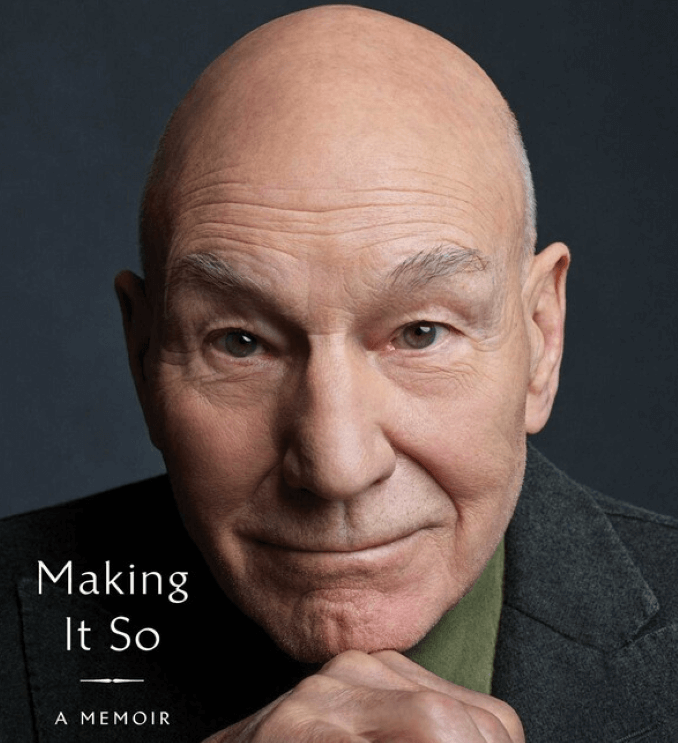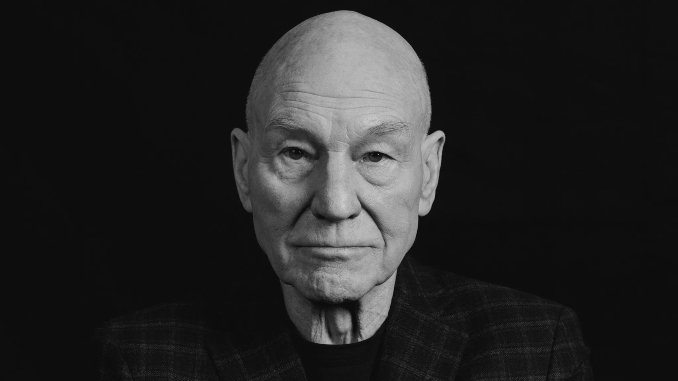Patrick Stewart is the reason why Star Trek is taken seriously.
Yes, the original series has some gems (“The City on the Edge of Forever” is a sci-fi masterpiece) and Deep Space Nine is an extraordinary, early experiment in the type of serialized storytelling that has now become commonplace. But before Star Trek: The Next Generation came along, before TNG‘s producers gambled on hiring a fortysomething, bald, Shakespearean actor as the new captain of the USS Enterprise, Trek was in a very different place. The original 1960s TV series (cancelled after three seasons), remained cult beloved but undeniably campy, largely kept alive by fan-organized conventions (some of the earliest comic cons) and, at the time TNG debuted, by a fitfully successful series of films capitalizing on – but never matching – the success of the Star Wars franchise.
What Stewart brought to Star Trek, and what inevitably informed the stories that TNG told, was a certain dignity, a respectability earned not merely because he happened to speak with an English accent, but because he was – and is – a damn fine actor who took the work seriously. Stewart’s influence is particularly felt in the later seasons as the cast – which included the likes of Jonathan Frakes (Commander William Riker), Brent Spiner (Lieutenant Commander Data), and Michael Dorn (Lieutenant Worf) – took a more active role in pushing the series in interesting creative directions. There is no doubt that Stewart had an enormous amount of fun in making TNG. But he also, by treating the material with the utmost respect, inspired Trek – its writers, its directors, his fellow actors – to do better.
As his wonderful new memoir Making It So – and a recent promotional appearance at Toronto’s Hot Docs Cinema – reveal, the journey to superstardom for this working-class child of Northern England coal country, was far from assured.

Sir Patrick Stewart, born July 13, 1940 in the West Yorkshire town of Mirfield, England, has been many different things: a Starfleet captain, a Marvel mutant superhero, Alec Guinness’s nemesis in the excellent Tinker Tailor/Smiley’s People miniseries, a corrupt Roman soldier in the equally excellent I, Claudius miniseries, and King Henry II in the tragically overlooked Lion in Winter remake. On stage, he’s been Shylock, Oberon, Macbeth, and Prospero, and, in more recent years, co-starred with friend and fellow acting legend Ian McKellen in acclaimed productions of Beckett’s Waiting For Godot and Pinter’s No Man’s Land. The one and only time I saw him on stage, he was one of a band of Improvised Shakespeare players in a guest appearance with the company of that name.
In life, Stewart has also been many things: Head Boy at an English grammar school; reporter for a small-town newspaper; salesman/jack-of-all-trades at a furniture shop. Also, an outspoken advocate about domestic violence (which, as outlined in Making It So, formed an unfortunately central part of his childhood), women’s rights, PTSD (his father, perpetrator of said violence, was a WWII veteran who never quite escaped the trauma of the war), and on behalf of the unfairly maligned pit bull dog breed. He is also, I am delighted to report, a classical music aficionado, with a particular affinity for Mozart’s Piano Concerto No. 21. (His episode of BBC’s Desert Island Discs is fantastic.)
Stewart’s memoir is an interesting, occasionally illuminating journey through an undeniably extraordinary life. The early chapters, detailing his childhood in relative poverty in frigid northern England (the family’s unheated outhouse was one of the few places young Patrick could go for peace and quiet, holding a candle over the comic books and adventure novels that so captivated him), are probably the most revealing, painting a picture of the thousand or more challenges faced by Stewart and others growing up in that era. While his frequent, self-conscious nods to future success – “yes, that’s right, the future captain of the Starship Enterprise grew up without indoor plumbing!” – can be grating, the account of his upbringing is still fascinating, and occasionally tragic. The physical abuse inflicted by his father Alfred on his mother, Gladys, is difficult to read about, but it’s to Stewart’s credit that he has parlayed that terrible family history into a lifelong passion for women’s rights and support for victims of domestic violence.
The remainder of the memoir tracks his early successes as a young and upcoming stage actor; his transition to film and television; the Star Trek (and, to an extent, X-Men) years; and, finally, the superstardom that followed. The stage/Royal Shakespeare Company sections are at their best when he’s either discussing the actor’s craft or when he’s name-dropping, albeit in a respectably unassuming way. His discussion of working with eternal legend Vivien Leigh, in his very first international tour, is a highlight, as is his friendship with a young actress named Jane Asher, whose boyfriend Paul drops by for a couple pages. One gets the impression that Stewart remains genuinely awestruck by the people he’s been privileged to spend time and work with. We don’t normally associate Stewart with the other working-class acting greats like Tom Courtenay, Michael Caine, or Albert Finney, but, as Making It So makes plain, Stewart is very much a proud exemplar of that (mostly vanished) tradition.

Despite my reputation as a diehard Trekkie, I confess I quite like Stewart’s decision to leave the Trek years to the latter part of his memoir, some three hundred or so pages in. Stewart’s life and career are so much more than one role, even if that role – winkingly alluded to in the book’s title – is the one for which he, deservedly, will be best remembered.
From the early days sharing a stuffy two-room house in remote West Yorkshire, through to his modern fame, including repeat visits to Toronto to film the last few seasons of Picard, Stewart’s is a fascinating story, boldly going where no other Yorkshire lad has gone before.
***
Patrick Stewart’s Making It So is published by Simon & Schuster. Find your copy here.



